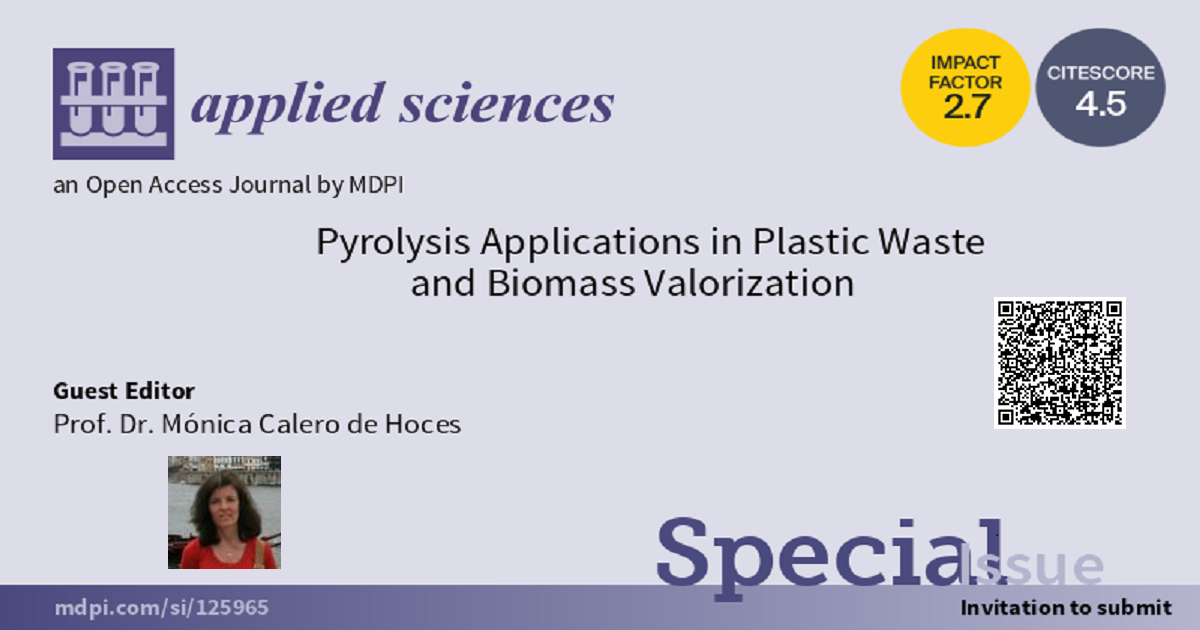Pyrolysis Applications in Plastic Waste and Biomass Valorization
A special issue of Applied Sciences (ISSN 2076-3417). This special issue belongs to the section "Energy Science and Technology".
Deadline for manuscript submissions: 31 May 2024 | Viewed by 2341

Special Issue Editor
Interests: biomass gasification, pyrolysis, and torrefaction; adsorption of contaminants (mainly heavy metals) by porous solids; advances in mineral processing and management of mining waste; plastic waste management
Special Issues, Collections and Topics in MDPI journals
Special Issue Information
Dear Colleagues,
Plastic materials have been crucial to the development of science, technology, and almost all aspects of modern progress since the mid-twentieth century. However, the increasingly unsustainable culture of plastic consumption and the accumulation of plastics in landfills, oceans, and broader ecosystems have also caused negative and potentially irreversible environmental impacts. In recent decades, scientists and engineers have spent significant time and resources searching for more effective plastic waste management techniques based on thermochemical routes such as pyrolysis. On the other hand, biomass is a renewable source and potentially sustainable fossil fuel replacement due to its availability, lower processing cost, high conversion, and lower life cycle carbon emissions. Pyrolysis can also be used to convert biomass into high-quality liquid fuels and chemicals. Pyrolysis can be improved by the use of catalysts, which can reduce the temperature and reaction time and allow the production of chemicals with a higher added value.
This Special Issue seeks recent advances in both thermal and catalytic pyrolysis. The pyrolysis mechanisms, the influence of operating parameters and catalysts, and the characterization and applications of pyrolysis products will all be discussed.
Prof. Dr. Mónica Calero de Hoces
Guest Editor
Manuscript Submission Information
Manuscripts should be submitted online at www.mdpi.com by registering and logging in to this website. Once you are registered, click here to go to the submission form. Manuscripts can be submitted until the deadline. All submissions that pass pre-check are peer-reviewed. Accepted papers will be published continuously in the journal (as soon as accepted) and will be listed together on the special issue website. Research articles, review articles as well as short communications are invited. For planned papers, a title and short abstract (about 100 words) can be sent to the Editorial Office for announcement on this website.
Submitted manuscripts should not have been published previously, nor be under consideration for publication elsewhere (except conference proceedings papers). All manuscripts are thoroughly refereed through a single-blind peer-review process. A guide for authors and other relevant information for submission of manuscripts is available on the Instructions for Authors page. Applied Sciences is an international peer-reviewed open access semimonthly journal published by MDPI.
Please visit the Instructions for Authors page before submitting a manuscript. The Article Processing Charge (APC) for publication in this open access journal is 2400 CHF (Swiss Francs). Submitted papers should be well formatted and use good English. Authors may use MDPI's English editing service prior to publication or during author revisions.
Keywords
- biomass
- plastic waste
- thermal pyrolysis
- catalytic pyrolysis
- valorization
- waste treatment





